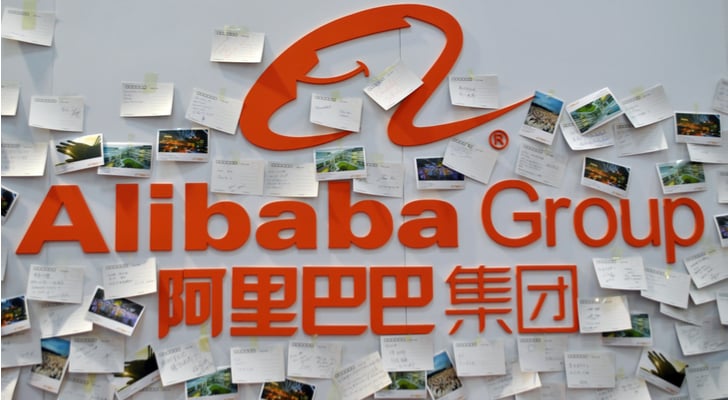With any foreign stock, you’re not just betting on the company; you’re also betting on currency. This is especially true when dealing with a Chinese company like Alibaba Group Holding (NASDAQ:BABA), which is due to report earnings on August 23 before the U.S. market opens. The on-again, off-again trade war with China has been driving Alibaba stock, as China has slowly lowered the value of the yuan against the dollar.

The Chinese currency was at 6.27 to the dollar in April. It’s currently at 6.88, having reversed its move toward seven after agreeing this week to hold trade talks with the U.S. Those talks will focus, not on the intellectual property issues that most concern the U.S., but on the yuan, which the U.S. now wants very much to go up. And when the yuan goes up, what do you think happens to Alibaba stock? It goes up.
Valuing Alibaba Stock
The fall of the yuan has made Alibaba stock a relative bargain. It was selling for $208 per share in June. As of yesterday’s open, it stood at about $170. With peace appearing to break out, it opened today at $172.58.
The move had little to do with the company’s results. Alibaba’s revenues were 20% higher during the March 2018 quarter than for its quarter that ended in June, 2017. In the June, 2018 quarter, they’re expected to be 25% higher still, at $12.42 billion. As the yuan falls, in other words, Alibaba’s revenue grows. And when the yuan rises, Alibaba also grows.
Alibaba translates each quarter’s revenues and profit from yuan into dollars as of the day that they’re reported. When it reported its March, 2018 results, the yuan stood at 6.33. If Alibaba wasn’t growing like a weed, you wouldn’t have seen its dollar-denominated revenue jump by 25% But you did.
Our Joseph Hargett had it exactly right. Alibaba stock is a steal right now. It’s as big a steal as it was when I bought my shares, at an average price of about $101, late in 2016 and early in 2017. If you buy now, you’re going to get organic growth equal to that of Amazon.com (NASDAQ:AMZN), albeit from a smaller base, and you’re going to get any future appreciation in the yuan that the Trump administration can obtain.
Challenges for Alibaba Stock
That’s not to say there aren’t challenges for Alibaba stock.
A few years ago, Alibaba was uniquely positioned as a platform, or a middleman, between small producers and retailers. More recently, it has invested heavily in brick and mortar, including armies of delivery people
.
Buildings and people don’t scale as well as computing does, so Alibaba’s margins are declining. The company was bringing over one-third of its revenue to the bottom line as recently as September. In June, that proportion fell to one-fifth of revenue. You can expect that trend to continue into the fall.
Alibaba has now become the model others copy. Amazon’s re-imagining of Whole Foods, with its app-driven loyalty program, is almost identical to the changes that Alibaba made to Hema Supermarket. Amazon’s new efforts to enable consumers to use virtual reality for shopping also mimic what Alibaba is doing.
The Bottom Line on Alibaba Stock
Alibaba is, over time, becoming more like Amazon, in the best possible way. It has a fast-growing cloud business, it owns the South China Morning Post (just as Amazon founder Jeff Bezos owns the Washington Post), it has a Prime-like membership program called VIP, and it streams video.
Alibaba also has some things that Amazon doesn’t, including its own mobile payments platform and a closed market that is still developing and growing.
Investors have recognized this by giving Alibaba a higher valuation than Amazon in some ways; BABA has a market cap of $442 billion, about half that of Amazon, on 2018 revenue of only $40 billion.
But Alibaba may be having a better year than Amazon. And as the yuan rises, so will the Chinese giant’s results.
Dana Blankenhorn is a financial and technology journalist. He is the author of a new mystery thriller, The Reluctant Detective Finds Her Family, available now at the Amazon Kindle store. Write him at danablankenhorn@gmail.com or follow him on Twitter at @danablankenhorn. As of this writing he owned shares in BABA and AMZN.
